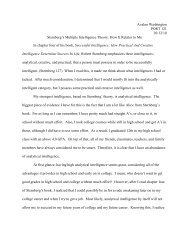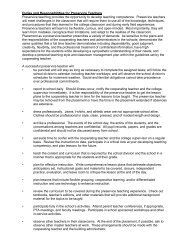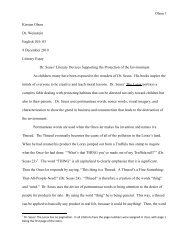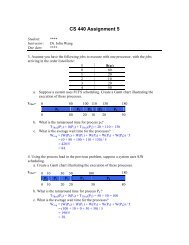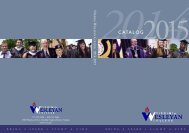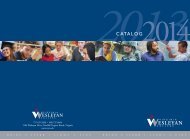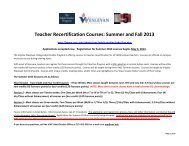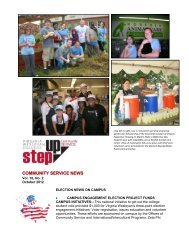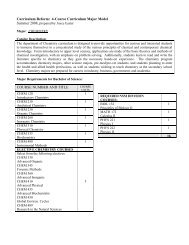2008-2009 Catalog - Virginia Wesleyan College
2008-2009 Catalog - Virginia Wesleyan College
2008-2009 Catalog - Virginia Wesleyan College
- No tags were found...
You also want an ePaper? Increase the reach of your titles
YUMPU automatically turns print PDFs into web optimized ePapers that Google loves.
PSYCHOLOGY153374 Adolescent Development (3)Provides a comprehensive and in-depth examination ofthe physical, social, emotional, and cognitive aspects ofadolescent development. Both normal outcomes andspecial problems are addressed. Prerequisites: junior/seniorstatus and PSY 201 or consent. Offered spring of oddnumberedyears.377 Nature of Human Consciousness (3)Students read a wide variety of works that provide acontext for inquiring about the origin of consciousness andits relationship to unconscious mental activities. The highlyanalytical, manipulative, and verbal states of mind arecompared to those that are more integrative, receptive, andmagical. Evidence is presented that these two modes ofoperation can lead to sharply contrasting conceptions ofwhat is true, possible, and worthy. The ultimate objective isto understand how the interplay of these distinctive, yetcomplementary, styles of information processing shapeseach person’s subjective version of reality. Prerequisites:junior/senior status and any 200-level psychology course.Offered intermittently.388 Cognition (3)Examines research findings that help us understand howpeople perceive, remember, and think. These informationprocessingfunctions are described in terms of interactingmental activities such as pattern recognition, allocation ofattention, concept formation, encoding, hypothesis testing,and internal monitoring of problem-solving strategies.Evaluation of a person’s intelligence is viewed as adiagnostic task that attempts to assess the relative efficiencyof these various processing components. Extensiveopportunities are provided for students to gain valuableinsights regarding their own cognitive skills. Prerequisites:junior/senior status and any 200-level psychology course.Offered spring of odd-numbered years.389 Topics in Psychology (3)An advanced seminar designed to study the primaryliterature on various announced topics in psychology.Topics will vary from semester to semester and may include,but are not limited to: community psychology, correctionalpsychology, ethics, interpersonal relationships, and psychologyof women. May be repeated for credit as topics change.Prerequisite: junior/senior status, any 200-level psychologycourse or consent. Offered intermittently.394 “Reel” to “Real” to “Reel”: PsychologicalReality in Cinema, Story, and Science (3)(Winter Session)An explanation of psychological topics of interestthrough the multiple lenses of nonfiction writing, films,and scientific reporting. How do each of these ways oftelling us about ourselves shape our understanding ofpsychological reality? How do our background andexperiences, including our understanding of psychologicalreality, shape our understanding of the psychologicalthemes that are embedded in nonfiction writing and infilm? Why is it important to answer these two reciprocalquestions? To assist us in our search for answers, we readspecific memoirs, biographies and scientific works inaddition to viewing related films. Clinical, social psychological,and developmental themes are emphasized; and bothindividual and societal consequences of alternative ways of“knowing” psychological realtiy are discussed. Prerequisites:junior/senior status, any 200-level psychology course orconsent. Offered in selected Winter Sessions.445 Ecopsychology (3) (I)Integrates elements of ecology (the science and study ofhabitat) and psychology (the science and study of behavior)in an effort to explore historical and contemporaryenvironmental issues and problems. Ecopsychology also hasroots in theology, philosophy, anthropology, and activistpolitics. Concepts are applied both to urban and wildernessenvironments and to both humans and wildlife. Aspects ofWestern intellectual thought that influence contemporaryviews about nature are examined. Particular fields andtheories of psychology are studied and applied toenvironmental difficulties. An assumption of this course isthat it is crucial to understand the roles of human behavior,beliefs, decisions, and values as both causes and solutions ofenvironmental problems. Prerequisites: junior/senior statusand completion of most General Studies requirements.Offered each fall.455 Biological Psychology (3)Comparative and evolutionary perspectives are utilizedin an attempt to understand how the anatomical andphysiological characteristics of the endocrine and nervoussystems relate to cognitive and affective psychologicalfunctions. Prerequisites: junior/senior status and PSY 201.Offered fall of even-numbered years.468 Current Psychoanalytic Theories (3)Provides an overview of modern psychoanalyticconcepts of mental illness and health. Topics includeautonomous ego, object-relations theory, affect theory,sexual and aggressive drives, and defense mechanisms.Prerequisite: junior/senior status, PSY 355, 466 or consent.Offered intermittently.477 History & Systems ofModern Psychology (3)(I)An interdisciplinary examination of the history andsystems of modern psychology focusing primarily on theperiod from the late nineteenth century to the present.Students experience this history through studying the livesof eminent psychologists who contributed to the discipline,their major ideas as presented in their original writings, theschools of thought which they founded or to which theygave allegiance, and the times in which they lived.Understanding the intellectual, social, political, andeconomic context in which particular ideas flourished orwere supplanted are a particular concern. Students leave thecourse with a solid grounding in the history of thediscipline of psychology as well as an appreciation for its



